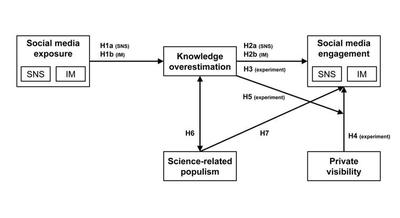The interplay of knowledge overestimation, social media use, and populist ideas: Cross-sectional and experimental evidence from Germany and Taiwan
Abstract
Social media expose users to an abundance of information about various issues. But they also make it difficult for users to assess the quality of this information. If users do not recognize this, they may overestimate their knowledge about those issues. Knowledge overestimation may lead to increased social media engagement and can be linked to attitudes deeming expert knowledge inferior to common sense, such as science-related populist attitudes. We investigate this during the COVID-19 pandemic in two preregistered, cross-sectional survey experiments in Germany and Taiwan, two countries with different cultures, media environments, and responses to the pandemic. Our study offers two contributions. First, we develop a novel measure of COVID-19-related knowledge. Second, we provide comparative evidence on how social media affordances shape the interplay between knowledge overestimation, social media exposure and engagement, and populist attitudes. We do not find that frequent exposure to COVID-19 information is associated with a higher likelihood of knowledge overestimation. However, we show that overestimation is linked to more user engagement with social media content about COVID-19. Experimental data indicate that engagement depends on whether users are in a private or public communication environment. We find minor differences between Germany and Taiwan.

Hypothesized relationships of components investigated in this study. Note: SNS = social networking sites, IM = instant messengers.